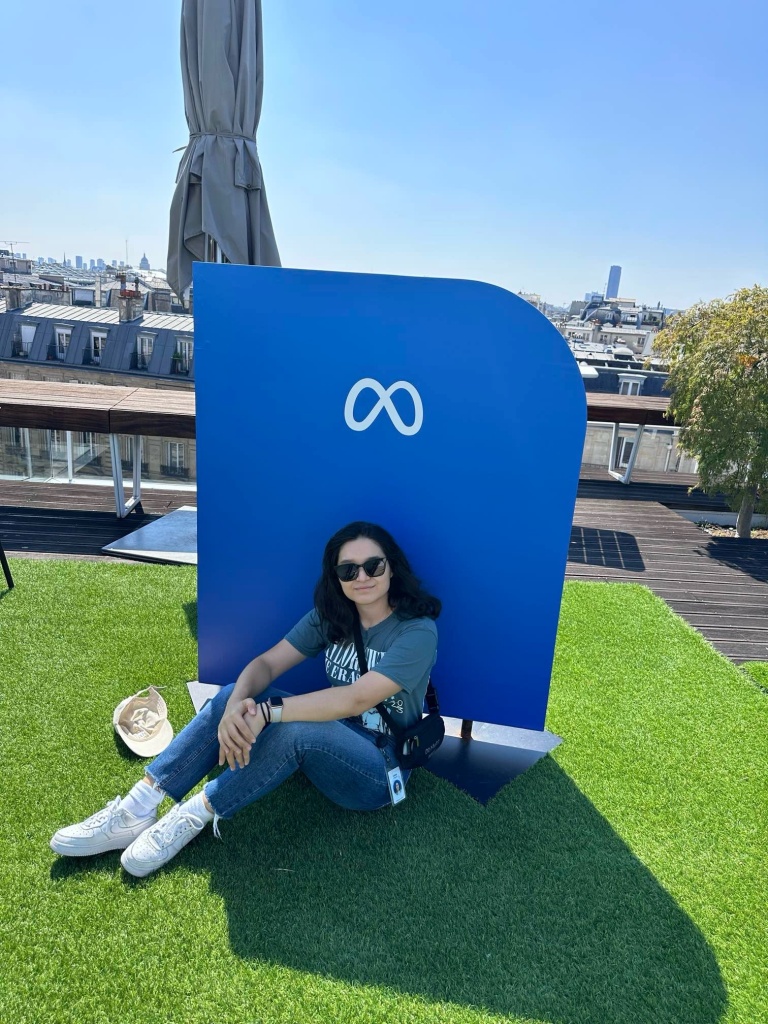Young software engineers share their experience landing a role at one of the world’s biggest tech companies — Meta. They talk about the interview process, the challenges they faced, and what truly helped them stand out among hundreds of applicants. Curious about NVIDIA? See how others made it here.
Zarina Tolagayeva, 24 years old, city — Seattle, Product Manager, linkedin

About the company
I work at Meta. My team focuses on growing the Facebook Marketplace platform and expanding it through partnerships with other large companies.
As a product manager, I oversee product strategy and launches. I handle everything — from developing the strategy for how the product should function to working with engineers and designers.
Leadership skills and the ability to bring clarity to both processes and product usage are crucial for my role. If a product manager doesn’t have a clear vision of the product’s goals for the next six months to two years, achieving results becomes difficult. When the team has questions about technical details or user experience, the PM must step in to clarify: either by finding the right expert with answers or by defining how things should work and discussing it with leadership.
Career path
I started at Meta in a junior role through the Rotational Product Manager program. This program specifically targets individuals with no prior experience in product management. You rotate through three different teams while gaining essential skills.
I applied through the website, passed three rounds of interviews, and received an offer. The interviews included product case questions — there were five such interviews in total.
It was challenging at first without a technical background because I had to understand engineering jargon to be able to help the team. It took me about six months to truly grasp what product managers do. Each team works differently, so adaptability is key.
I prepared thoroughly for the interviews and developed a strong product mindset. It’s important to articulate your thoughts clearly and adapt quickly to follow-up questions — and I managed to do that. My internship experience also helped, as I worked with diverse teams and was able to clearly explain how I understood their needs and could represent their interests.
Adapting to the role
I had never worked in such a massive company before, so it was initially hard to figure out which tools people used. It also took time to adjust to the varying work styles across different teams.
What I really like about Meta is its friendly and open culture, which I think sets it apart from many other companies.

People in the U.S. are welcoming. Regardless of your position, you’re respected, your opinions are heard, and people are always willing to help.
My work-life balance depends on the stage of my projects. Most of the time I work no more than eight hours a day, but my schedule can vary. Sometimes I have to wake up early to work with Europe, and other times I work late when there are no meetings and make up for it later.
By the way, my puppy helps me keep a healthy balance — he won’t wait for me to finish a task and always reminds me when it’s time to take a break.
How to get a job at a global company
Many people think it’s important to list soft skills on a résumé, but in reality, showing concrete projects and work experience that align with the job is far more valuable.
If you’re still in university, try out personal or group projects where you can demonstrate key skills — whether leadership or technical. Big companies expect you to already know basic Microsoft tools, but technical skills matter more. If you lack them, highlight your leadership experience — even if it comes from volunteer work.
Another common mistake is poor interview preparation. Let’s say you’re applying for a product manager role — don’t just send out applications. Study what the interviews involve. Look for online resources, watch YouTube videos that break down product cases, and connect with others who are also preparing. If you can find a professional to run a mock interview with you, that’s an ideal scenario.
Recommendations
Prepare thoroughly! If you’re an engineer — practice problems on LeetCode regularly. If you’re a product manager — keep analyzing product cases.
If you’re applying to a major company, study its mission, dissect its products, and think about who they’re made for, how they work, and what problem they solve. This will help during the interview.
Refine your skills and craft a strong résumé that gets you invited to interviews.
Diana Besterekova, 23 years old, San Francisco — Software Engineer, LinkedIn

About the company
Meta is one of the largest tech companies in the world, owning Facebook, Instagram, and WhatsApp — apps used by almost everyone globally. The company also focuses on other areas of growth, including artificial intelligence and virtual/augmented reality.
I work as a Junior/New Grad Software Engineer — a title used for recent graduates. I’m involved in development within the VR/AR space. My job is to improve the experience for new users of Meta Quest — our virtual and augmented reality headset. This includes debugging, identifying and fixing issues, and testing new features.
Being a versatile developer is important in my role, as we use different programming languages depending on the team. It’s also crucial to analyze bugs and quickly find how they’re connected to other components in order to fix them efficiently. My company also places strong emphasis on soft skills — it’s essential to collaborate not only with your own team, but also with designers, engineers, and analysts.
Career path
When I saw an open position at Meta, I immediately messaged a university acquaintance already working there and asked for a referral. Then I applied through the careers portal. I was contacted within a couple of days, completed an online assessment, and was invited to the final round, which consisted of three interviews — each almost an hour long.
The process was tough for me. By that point, I had submitted over 400 applications across the U.S. and Europe, solved hundreds of LeetCode problems, but rarely received any replies.
My biggest challenge was self-doubt — wondering whether I could actually make it into software engineering. I often felt uncertain, especially as a woman in tech. But I was always supported by close friends who had interned and worked at top tech companies.
What helped me land the Meta offer was a strong résumé that highlighted my strengths. During university, I interned at a startup in India and co-authored a research paper with a Stanford-affiliated lab. All of this showed that I was adaptable, capable of handling various projects, and able to communicate effectively with diverse teams.
Adapting to the role
My adaptation period went smoothly — I had enough time to rest before starting work. During the first three weeks, every new hire goes through bootcamp, where we learn about the company culture and internal tools. I quickly got used to the schedule, but I still learn helpful tips from my colleagues every day.

When I interviewed at one of the Big Four companies in Kazakhstan, I was immediately asked if I was ready to work overtime. At Meta, overtime is not encouraged — though some teams do have tight deadlines depending on the project.
Another difference is the lack of rigid hierarchy. Managers and tech leads don’t “monitor” you daily — communication is based on trust. For example, during 1:1 calls, we talk not just about work, but also about pets or recent trips.
Meta offers many perks — the company can cover gym memberships, pet grooming, or workout gear. These help you recharge and maintain a healthy balance.
After 6 PM, I don’t open my laptop until the next morning, and my weekends are fully mine. I’m required to be in the office only three days a week; the other two are flexible — I can sleep in or go for a morning run.
How to get a job at a global company
One of the most common mistakes when applying to a major international company is submitting an incorrect résumé. Many candidates don’t follow international standards — for example, making the résumé too long. In most cases, anything longer than one page doesn’t pass the initial screening.
Another mistake is underestimating the importance of English. Some believe that high proficiency isn’t necessary, but in reality, it’s the number one tool. It’s needed everywhere — in business communication, interviews, and technical assessments.
It’s also crucial to consider a company’s cultural values. For instance, Meta and Amazon have very different corporate principles. If a candidate hasn’t researched them beforehand, they might fail the interview despite having strong technical skills.
Some applicants skip preparation for technical interviews — they don’t solve LeetCode problems or do mock interviews. Today, algorithmic problems are like the SATs of tech recruiting. Even for senior roles, data structure and algorithm knowledge is still assessed.
To prepare effectively, it’s essential to do as many mock interviews as possible. This builds communication skills — being able to explain your thought process clearly is just as important as solving the problem. A good approach is to join a community of friends or classmates and practice solving and discussing problems together.
Another critical aspect is preparing for behavioral questions. I practiced for these interviews using a Google Doc: I found a list of common questions, wrote out detailed answers, and asked friends to review and provide feedback. The key is to use the STAR method — Situation, Task, Action, Result — to keep your answers structured and logical.
And don’t forget to ask questions at the end of the interview. I always had a personalized list ready — adapted to the interviewer’s experience. Even if the interview wasn’t perfect, this is a great opportunity to learn more about how the company operates from the inside.
Recommendations
For aspiring developers, internships are key to gaining experience. It doesn’t matter how big the company is — what matters is having real projects in your portfolio. This proves you can work in a team and handle various tasks.
Before applying, study the market. A detailed analysis of job requirements and interview processes in global companies will help you prepare better. Most Western companies follow similar interview formats, so understanding those structures gives you a competitive edge.
Networking plays a vital role. Attending events, joining hackathons, and staying open to new connections can lead to unexpected opportunities. When I applied to Amazon, a friend helped me get a referral — this shows that strong professional relationships matter more than just exchanging contacts.
It’s important to think globally and not put up artificial barriers. Many people in our region hesitate to apply out of fear of rejection. But success comes to those who take risks.